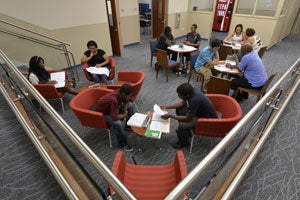Learning from Our History: An Exhibit of Dockets for Enslaved People in Delaware County is Opening at �����ϲ� This Month
 (Delaware and Chester Counties, PA • February 7, 2022)—The Delaware County Bar Association and �����ϲ� have joined together to provide a year-long residency at the College’s Marple Campus of a docket for enslaved people in Delaware County. This well-preserved docket contains information from judicial proceedings, as well as certain registration and manumission affidavits related to enslaved people in Delaware County from the years 1762 - 1831. The Delaware County Bar Association became the custodian of the docket approximately 15 years ago.
(Delaware and Chester Counties, PA • February 7, 2022)—The Delaware County Bar Association and �����ϲ� have joined together to provide a year-long residency at the College’s Marple Campus of a docket for enslaved people in Delaware County. This well-preserved docket contains information from judicial proceedings, as well as certain registration and manumission affidavits related to enslaved people in Delaware County from the years 1762 - 1831. The Delaware County Bar Association became the custodian of the docket approximately 15 years ago.
In celebration of the residency, a virtual opening ceremony will be held 5 p.m. to 6:15 p.m., Thursday, February 17, marking the opening of Learning from Our History: An Exhibit of Dockets for Enslaved People in Delaware County. During this ceremony, Nathaniel C. Nichols, retired judge of the Delaware County Court of Common Pleas, and �����ϲ� Political Science Professor Dr. Ife Williams will discuss the significance of the docket and what we can learn from it. The ceremony will also feature readings from notable works that shed light on the history and impact of slavery in the United States.
.
The docket will be on display beginning February 18 in the Learning Commons on the College’s Marple Campus at 901 S. Media Line Road, Media, PA 19063. To learn more, please visit www.dccc.edu/dockets-exhibit.
“The College is privileged to partner with the Delaware County Bar Association to provide a temporary home to this historic docket during Black History Month,” said �����ϲ� President Dr. L. Joy Gates Black. “This will give our students, faculty and staff, as well as community groups, residents and children of all ages, a wonderful opportunity to learn the significant impact slavery had on America and its history.”
This Learning from Our History exhibit is part of a year-long celebration of the 150th anniversary of Delaware County Bar Association, which will highlight not only those events, activities, achievements, individuals, edifications and institutions which existed contemporaneously with the Association over the last 150 years, but also the events and people that preceded the formation of the Association.
More about the docket
The docket is the original official transcript of criminal and other legal matters relative to persons of African ancestry living in what was then Chester County, Pennsylvania. The first entry dates to 1762. What we now know as Delaware County was once part of the original Chester County. The county of Delaware was created in 1789, when it split from Chester County.
On November 27, 1700, the Pennsylvania General Assembly passed “An Act for the Trial of Negroes.” Acts such as this were passed throughout the colonies and commonly referred to as “Slave Codes.” This Act did not specifically reference
slaves, though it was primarily applied to slaves. By 1725, however, these provisions applied to all black people in Pennsylvania, whether enslaved or free. The Act established a Court consisting of two justices of the peace of the respective counties, along with “six of the most substantial freeholders of the neighborhood” to hear the evidence presented against the accused and determine guilt or innocence.
The Act for the Trial of Negroes set forth the various offenses that would be applicable, along with the punishments to be meted out. In addition to common law crimes such as burglary, rape and murder, there were additional crimes applicable only to black Pennsylvanians. Punishments ranged from whippings to death by hanging. The Act also provided that the owner of any person who was convicted of a crime was required to make satisfaction to the wronged party.
The docket on display at the College is just one of the dockets that chronicled the trials that took place. This particular docket sets forth, in the original handwritten form, a summary of the trials occurring in then Chester County from 1762-1772. It also includes several registrations of then enslaved Pennsylvanians, of whom registration was required by the Act of 1780. In addition, the docket contains the registration of slave manumissions. These registrations were vital for the enslaved person to prove that he or she was granted his or her freedom and therefore not subject to the Fugitive Slave Acts of 1793 and 1854. While the trials were from 1762- 1772, the documents run through 1831 and include the registrations of slaves, as well as manumissions and the listing of local and county officials.
Learning from Our History Exhibit Acknowledgements
�����ϲ� President Dr. L. Joy Gates Black; �����ϲ� Board of Trustees; Board of Judges of the Delaware County Court of Common Pleas (for their donation of the dockets to the Delaware County Bar Association (DCBA)); Retired Judge Nathaniel C. Nichols (for his work on the presentation); Historical Committee (Colleen Neary, chair); O. Warren Higgins, Esq. (past chair of the DCBA Historical Records Committee); Harry Spies, Esq. (past chair of the DCBA Historical Records Committee); Elizabeth C. Price (1st executive director of the DCBA); William Baldwin, Esq. (executive director of the DCBA); �����ϲ� Professor Dr. Ife Williams (for her work on the presentation); Patricia Swanson (for her photos of the dockets); and the �����ϲ� "Learning from our History" Planning Committee.








